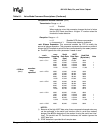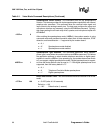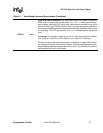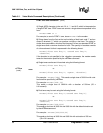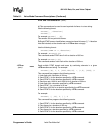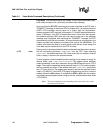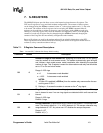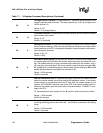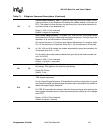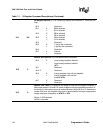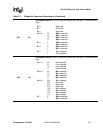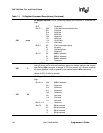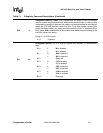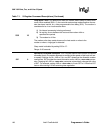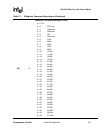
56K V.92 Data, Fax, and Voice Chipset
Programmer’s Guide Intel Confidential 103
S9 6
Carrier Detect Recovery Time: S9 specifies how long the remote modem carrier
must be present on the telephone line before the modem detects it and turns on
DCD. The greater the time duration, the less likely that a false carrier detection oc-
curs due to noise on the telephone line.
Range: 1–255 (1/10 of a second)
Default: 6 (equals 0.6 seconds)
S10 14
Lost Carrier Hang Up Delay: For modes V.34, V.90 and V.92, the modem retries
the connection for S10 plus some base time before hanging up. The base time is 20
seconds in V.34 and 45 seconds in V.90 and V.92.
S10 reports the time in 1/10-second units beyond 20 seconds. For example, when
S10 = 0, the wait time is 20 seconds. When S10 = 100, the wait time is 30 seconds.
In V.34, V.90 and V.92 modes, the modem automatically retries the connection for
45 seconds when S10 = 1–254.
For all modes, the modem does not disconnect upon loss of the remote modem car-
rier if S10 is 255.
Range: 0–255 (1/10 of a second)
Default: 14 (equals 1.4 seconds)
S11 70
DTMF Dialing Speed: S11 specifies the duration of dual-tone multi-frequency (DT-
MF) dialing. This register is not used for pulse dialing.
Range: 50-255 ms
Default: 70 ms
S12 50
Guard Time: S12 is used to specify guard and detect times used for the Hayes and
TIES escape sequences.
For the Hayes Escape Sequence, S12 specifies the minimum-delay timer (or guard
time) before and after the three escape characters that is required for the modem to
detect the Hayes Escape Sequence.
For TIES, S12 specifies the maximum time limit that must elapse after receiving the
three escape characters (and no other characters) before sending an OK message
to the DTE.
Range: 0–255 (1/50 of a second)
Default: 50 (equals 1 second)
Table 7-1. S-Register Command Descriptions (Continued)



